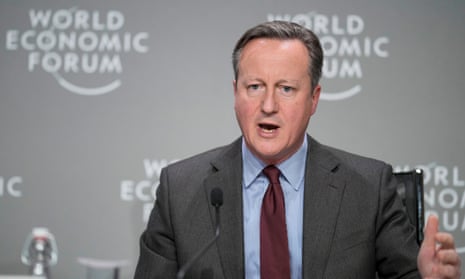
The United Kingdom is intensifying efforts to urge Western governments to utilize the $350 billion (£275 billion) of frozen Russian assets to assist in the reconstruction of Ukraine's war-ravaged economy. Former Prime Minister David Cameron emphasizes the legal, moral, and political justifications for such action.
Addressing the issue at the World Economic Forum in Davos, Cameron stressed the importance of leveraging the combined economic strength of the countries supporting Ukraine, which is 25 times the size of Russia. In the wake of Russia's illegal invasion in February 2022, the G7 nations froze Russian central bank reserves, and Kyiv has been increasingly urging for the seizure of these assets for reconstruction efforts.
Speaking on the matter, Cameron stated, "When Putin launched this illegal invasion, the world changed, and we have to change with it and recognize we are in a more dangerous, uncertain, and difficult world. We should be prepared to do some innovative thinking about how we use these resources to help Ukraine."
The moral argument, according to Cameron, is clear-cut and robust. He emphasized the need for Russia to pay reparations for its illegal invasion and suggested using some of the frozen assets now, rather than waiting until the war concludes and facing legal complexities over reparations.
While acknowledging concerns about potential impacts on financial centers and national reserves in western banks, Cameron dismissed these worries, expressing confidence in the ongoing efforts by the G7 to address the issue.
Bill Browder, CEO of Hermitage Capital Management and a vocal critic of the Kremlin, pointed out the urgency of swift action, particularly in light of the possibility of Donald Trump winning the next US presidential election. Browder highlighted the importance of seizing the $350 billion as a form of insurance against potential changes in US policy that could affect Ukraine's funding.
